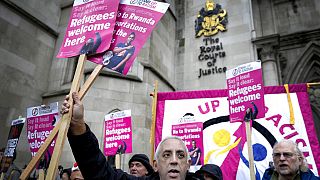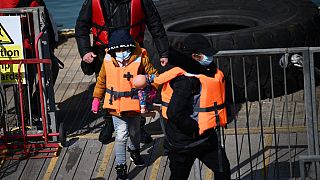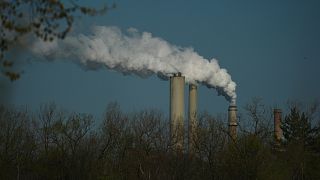United Kingdom
The UK's highest court is to hear on Monday the Conservative government's plan to deport illegal immigrants to Rwanda, a highly controversial measure aimed at discouraging illegal immigration.
The British government has made the fight against illegal immigration a priority and has promised to stop migrant boats crossing the English Channel.
The expulsion of migrants to Rwanda, a country with which London has an agreement, is presented by the government as a crucial measure for achieving this objective, but the project remains blocked by the courts.
In mid-2022, an initial flight was cancelled following a ruling by the European Court of Human Rights (ECHR).
At the end of June, the Court of Appeal in London ruled that the project was "illegal" and that Rwanda could not be considered a "safe third country".
There was "a real risk that people sent to Rwanda would be returned to their country of origin, where they were subject to persecution and other inhuman treatment", the court said.
Far from giving up, the government, which repeats that Rwanda is "a safe country", has appealed to the Supreme Court. The hearing, before five judges, is scheduled to last three days.
The decision, expected in several weeks' time, will be eagerly awaited by Rishi Sunak's government.
The Conservatives are far behind the Labour opposition in the polls, with general elections due to be held by January 2025.
"Extremely costly"
The government continues to toughen its stance on illegal immigration. In July, London passed a law banning migrants who arrived in the UK illegally from applying for asylum, regardless of the reasons why they fled their country.
The UN denounced the law as contrary to international law and expressed concern that "other countries, including in Europe" might be tempted to follow suit.
In September, British Home Secretary Suella Braverman, who is very much on the right, attacked the Geneva Convention, which has defined refugee status since 1951, saying that it was "not adapted to modern times". She also regularly attacks the ECHR.
On Tuesday, at the Conservative party conference, she warned of the migratory "hurricane" "that is coming", accusing the Labour opposition of wanting to "open the borders".
She raised the spectre of "millions" more migrants arriving on British shores, an "uncontrolled and unmanageable" flow unless the government that will be in power next year acts "decisively".
Since January, more than 25,000 migrants have crossed the Channel. The government boasts that it has managed to bring about a decline, following a record year in 2022, with more than 45,000 crossings over twelve months.
But the number of asylum seekers awaiting a decision from the British authorities reached a new record at the end of June: 175,457 people were awaiting an initial decision on their application, 43% more than a year earlier.
On Friday, Rishi Sunak and Italian Prime Minister Giorgia Meloni, leader of the post-fascist Fratelli d'Italia party, issued a joint statement calling on European countries to take urgent action to tackle the "moral crisis" represented by illegal immigration.
It is a "European crisis", they wrote, because it is up to the European states "to decide who comes to Europe, not the smugglers and traffickers".
On Sunday, Labour opposition leader Keir Starmer said he would reverse plans to deport migrants to Rwanda if he became prime minister.
"It's the wrong policy, and it's extremely expensive", he said on the BBC. He promised to work with other countries to "dismantle the criminal gangs involved in the despicable trade" of smuggling migrants.












Go to video
In Kenya, 90% of packaged food needs health warning label under new rules
01:52
In Goma, solar power brings light and hope in Ndosho neighbourhood
00:52
Nigeria’s Peter Obi to contest 2027 election, opposition coalition in jeopardy
Go to video
Cameroon’s Tourism Minister joins presidential race as Biya’s silence fuels uncertainty
02:13
Congo and Rwanda sign a US-mediated peace deal aimed at ending decades of bloody conflict
00:54
African Human Rights court says it can hear case brought by DRC against Rwanda